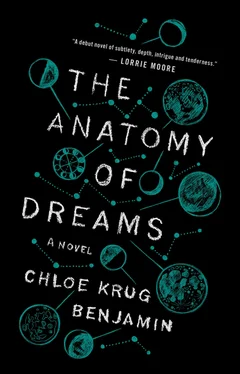“Isn’t that just Freud?” asked Thom.
“Partly.” I sat down beside him, my palms beneath my thighs. “Freud’s ideas make up the bedrock of dream interpretation, so it’d be impossible for us to avoid his influence—not that we’re trying to. Freud was the first to suggest that dreams give us access to the unconscious mind; he called them the royal road, the king’s highway. Dreams are almost entirely visual, but he gave us a language with which to talk about them, and it still holds up. Analysis is essentially an act of translation.”
“You’re old-school, then,” said Thom. “These days, don’t most people believe that dreams are meaningless? The brain sloughing off nervous tension?”
“It’s true. Our ideas aren’t popular. But dreams involve a whole host of brain mechanisms—they’re as rich in neurological activity as many conscious processes. There’s just too much going on for us to explain them away as random nerve firings.”
Thom grinned. “Do you believe in Freud’s other ideas, too, then? The sexual complexes? The idea that all dreams are wish fulfillment?”
I shook my head. “That’s where we’re more aligned with Jung. He thought dreamers could tap into resources of creativity and ingenuity, imagination and adventure. Healing, too. Besides, Freud never studied lucid dreaming. He relied on dream recollection, which means his patients reported their dreams after they woke up. But memory is fallible—it’s what makes eyewitness accounts notoriously unreliable—and that means the conscious mind isn’t trustworthy. Lucid dreaming allows patients to experience their dreams in real time. It gives them a panoramic view.”
“A sense of narrative,” said Thom.
“Exactly. Lucid dreaming also vastly improves dream recall, which means patients can work through their issues in the moment—and come away with a more thorough memory of what happened. It isn’t enough to go cherry-picking for symbols. Freud looked for the metaphors, but he didn’t string them together. He didn’t look for the full story.”
It was difficult to breathe. But if Thomas was starting to judge me, he didn’t show it; when he spoke, his tone was light.
“And why would anyone want to do all that work while they’re dreaming? Isn’t sleep supposed to be restorative?”
I laughed.
“Our patients don’t have a choice,” I said. “The people who come to us have sleep disorders—disorders that make them talk in their sleep and get out of bed.”
Thomas crossed his legs. I could see a childlike interest in him that made me think of what he must have been like as a boy—the floppy reddish hair, the round glasses, the long limbs in miniature.
“Still,” he said. “Why do you have to interfere in their dreams? You can’t send ’em to therapy while they’re awake?”
“These aren’t your garden-variety sleep issues—sleep apnea, insomnia. The patients we see have parasomnia overlap disorder and REM behavior disorder, dysfunctions that make them act out their dreams. Most of us are physically paralyzed during REM sleep, but these patients aren’t, and there’s nothing more dangerous than a dreamer out of bed. They can attack their bedmates, trying to fight off intruders who aren’t there. Some have even jumped out of windows. These people are disturbed at a subconscious level—and in order to help them, we have to meet them there. Lucidity enables them to realize they’re dreaming. It enables them to intervene.”
“So you’re hacking in.”
His face was pleasant enough, but his voice had a new edge.
“What do you mean?”
He leaned back on the bed, his elbows propped up behind him, and cocked his head.
“You’re intruders. Robbing the bank of the subconscious.”
“We’re breaking in, yes. But we’re helping them break in, too. We give patients the opportunity to see who they really are and how they came to be that way. It’s empowering.”
“To look at something is to change it,” said Thom. “Your patients have disorders—fair enough. But you’re still opening up a part of the brain that the brain itself has tried desperately to hide. There’s got to be an evolutionary reason we don’t remember most of our dreams. Some things are better tucked away, if you catch my drift. Some books shouldn’t be read.”
“But why?”
“Because,” said Thom. His brow was furrowed, as if he were thinking through a particularly difficult math problem, and his voice was neutral. “Couldn’t what begins as an exercise in self-knowledge actually reveal our darkest impulses? Once we experience our dreams—not via recollection, but right there in the moment—how long is it before we start to believe that this is who we really are, what we really want, how we really feel? You’re giving people access to their dreams as they’re happening, which must make the dreams feel infinitely more real—more believable. Couldn’t they lose track of what’s real and what’s not? Doesn’t the line begin to blur?” He sat up again and looked at me. “When does one’s dream consciousness become their consciousness, I mean? Maybe the dreams themselves aren’t dangerous. Maybe what’s dangerous is putting people in contact with them.”
He raised his eyebrows. My body was taut. This was exactly what I hadn’t wanted—someone doubting us, rummaging around and jumbling the thesis we had so painstakingly pieced together. I felt a part of myself begin to close off, like a person running to guard a half-open door. But it also felt even more important that I persuade him.
“Okay,” I said. “Two years ago, we saw a patient with RBD. She was thirty-five, a single mother of two. Ten years earlier, her house was burglarized while she was asleep, and that’s when her symptoms started. Back then, she was living alone. When she met her husband, her symptoms decreased—but five years later, they divorced, and her RBD came back. One night, she thought she saw a man crouched in the corner of her bedroom. She jumped on him, and that’s when she woke up, alone and bloody. She’d leapt onto her bedside table—knocked out four teeth and shattered a rib.”
“Jesus,” said Thom.
“With our training, she was able to become lucid. Once she realized she was dreaming, she could recognize the intruders for what they were—figments of her imagination, echoes of the past. She hasn’t had an incident since.”
That woman was one of our greatest, cleanest successes; without her, I doubted that Keller’s work would have been commissioned by the university.
“So that’s the goal, then? Healing the troubled souls of disordered dreamers? There’s no other motive?”
“What do you mean?”
Thom shrugged. He looked upward, and his glasses caught the light of the lamp.
“You’re looking at human capacity,” he said, “and trying to see how far it can be stretched. But who benefits more: the individuals you’re studying, or science ?”
“Well, we hope to benefit both of them.”
“Fair enough.”
“Why are you looking at me like that?”
“It’s just that experimental research isn’t usually so charitable.”
“Hey,” I said. “I’m all for asking questions, friendly debate, whatever you want to call it—but you really don’t know very much about us. We’ve been refining this procedure for years, trying to make sure it runs as smoothly and ethically as possible.”
“But smoothly and ethically are two very different things,” Thom said. “And sometimes, I imagine, they’re completely at odds.”
I must have bristled, because he seemed to realize he was crossing a line. He smiled, more warmly this time, his eyes wide with apology.
“Listen, I didn’t mean any harm. I tend to ask a hell of a lot of questions. That’s one thing you’ll learn about me, if we get to know each other better. It’s a nervous mechanism, partly.” He rubbed his palms together. “Besides, I’m an academic. I like these sorts of exercises. To me, it’s a theoretical debate—it isn’t personal.”
Читать дальше












